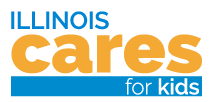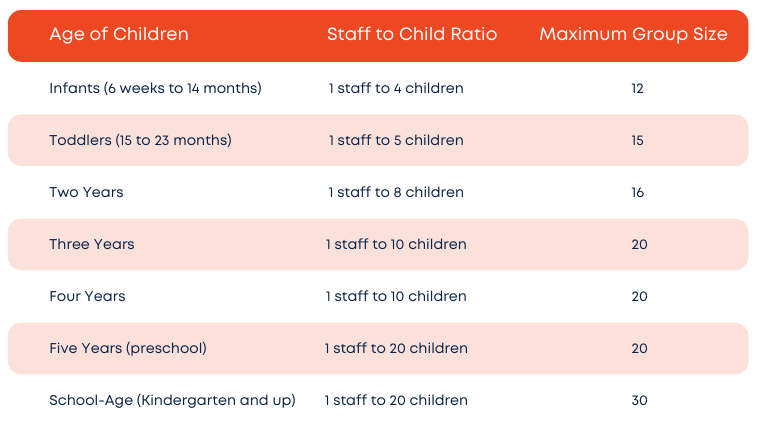

The Illinois Cares for Kids Online Child Care Search offers families an easy way to find a list of child care providers in your area. However, families need to have confidence in their child care arrangements. Finding quality, convenient, and affordable child care is not an easy job. The options and tips below will help you get started. Take a moment to read these before you start your search. If you have any questions about the Online Child Care Search call (217) 333-3252 option #3 or 1-(800)-325-5516 option #3.

There are three primary non-parental child care arrangements used by families in the U.S. Each has its unique advantages and considerations. No one type of care will be best for all families. The best child care arrangement is one which matches the child’s and family’s needs to the type of care provided.
Center-Based Child Care
Child Care Centers provide care for groups of children outside of a residential setting. Children are usually grouped by age. There are two types of child care centers: licensed and license-exempt. These centers may be Head Start, Early Head Start or Illinois Preschool for All programs.
Licensed Child Care Centers must meet Illinois Department of Children and Family Services (DCFS) standards for health and safety including child to staff ratios and required space per child. For licensed centers, the following staff to child ratios and maximum group sizes are set by DCFS.

Licensed-Exempt Child Care Centers are also recognized by Illinois, such as those serving children 3 years and older and operated by public or private elementary or secondary schools, faith-based organizations, institutions of higher education of other accredited schools registered with the Illinois State Board of Education. Since these settings are not licensed, they are not held to standards for health and safety, staff to child ratios or maximum group size set by DCFS.
The advantages of center-based care:
- Daily planned activities
- Opportunities for building social skills
- Consistent, year-round schedules that do not fluctuate
- Staff trained in child development and CPR and First Aid
- Opportunities for parental involvement in curriculum planning and policy-making
- Additional services such as special field trips, health screenings, music, dance, or gymnastic instruction
Things to consider when choosing center-based care:
- The inflexibility of operating hours; typically center-based care is open 7am to 5:30 or 6:00 pm, Monday through Friday only. Parents who are 1) working rotating shifts; 2) needing part-time care; or 3) work later evening hours/weekends all have a harder time finding centers that will accommodate their needs.
- Generally, centers have larger groups of children in a room with sometimes varying caregivers who work different schedules or need to cover shifts.
- Centers offer more structured settings with less ability to accommodate individual needs, routines, and interests.
Family Child Care
Family child care is provided in a home other than a child’s own home. There are three types of family child care: licensed homes, group homes and license-exempt homes.
Licensed Family Child Care Providers are providers who have obtain licensing through the Department of Children and Family Services (DCFS) by meeting the requirements set forth by the State of Illinois. Licensed providers must complete 15 hours of in-service training per calendar year and must also complete a 6-hour training on caring for children with disabilities. Providers who care for more than 3 unrelated children must be licensed.
Licensed Family Child Care Group Home Providers may care for up to 16 children (including their own) with the help of a full-time assistant.
For a full listing of requirements and steps to becoming licensed, please see our Becoming Licensed Provider Flyer.
License-Exempt Family Child Care Providers such as family, friend, and neighbor care may care for three or fewer children (including their own), or all of the children from one family.
The advantages of family child care:
- Smaller, home-like setting with one consistent adult
- Greater flexibility in hours; it is more common to find family child care provided during early or late hours, evenings, and weekends
- Fewer children and less structure which allows the caregiver to better accommodate individual needs and routines
Things to consider when choosing family child care:
- Lack of reliability; often, there is no substitute should the provider get sick or go on vacation
- High turnover rates among providers
- Variability in quality
In-Home Child Care
An in-home child care provider cares for your child in your residence. This caregiver could be a nanny, a relative, or an au pair. This type of care is not regulated by DCFS licensing standards. As a parent, you are the employer of the caregiver.
License-Exempt In-Home Child Care Providers such as family, friend, and neighbor care may care for three or fewer children (including their own), or all of the children from one family.
The advantages of in-home child care:
- Causes the least disruption to the child
- Greatest convenience to the parents
- Offers the highest degree of control over the care-giving situation (what and when the child eats and sleeps, what, if any T.V. is shown, which toys are played with, etc.)
Things to consider when choosing in-home child care:
- Cost; in-home child care is generally the most expensive of all arrangements
- Complexity of finding a qualified caregiver
- Loss of family privacy
- Difficulty in retaining caregivers and maintaining good communications; turnover rates in child care are generally highest among in-home caregivers)
- Legal, financial, and other requirements of the parents as employers
- Lack of social interaction opportunities for the child or caregiver
Backup Child Care
Backup child care is an alternative childcare arrangement made in response to an emergency, an unexpected event, or a disruption in regular, pre-arranged childcare. It is a safety net for when an everyday childcare arrangement breaks down.
The need for backup care should be expected by all parents. Life happens; nannies get sick, daycares close, work requirements increase, etc. The best backup care works if it is flexible and meets the family’s needs.
Our in-home booklet provides information on hiring a backup child care provider. CCRS also maintains a list of students that can be used for backup or evening-out child care. Please contact us for further information about either of these resources.

Play & Learn Quality child care offers many opportunities for all children to play each day. Counting, reading skills and problem solving are just a few things learned through play. 💡TIP: Look for a provider who focuses on all aspects of your child’s development including language, social, emotional, physical and cognitive.
Qualifications There are different caregiver qualifications for different child care settings. Training, education, experience and credentials prepare a child care provider to meet your child’s development needs. 💡TIP: Request a provider’s qualifications and references to learn more about their child care experience.
Positive Interactions A quality child care provider guides children, helping them to get along with others in caring positive ways, and encourages you to be involved as well. 💡TIP: Look for a provider who is enthusiastic, attentive and encouraging.
Program Quality All licensed child care programs are part of the ExceleRate Illinois Quality Recognition and Improvement System (QRIS). Programs can earn a Bronze, Silver, or Gold Circle of Quality or a national accreditation award by meeting voluntary standards for quality child care that are higher than the state licensing requirements. 💡TIP: Ask the provider if their program has an ExceleRate Illinois Circle of Quality or is accredited.
Environments A quality child care environment is safe, clean and provides children with many learning opportunities. 💡TIP: Look for a setting where the children are supervised at all times, nutritious meals and snacks are served and where toys and learning activities are based on the age of the child.
Financial Assistance The Illinois Department of Human Services Child Care Assistance Program provides financial help for families who meet income and work or education/training requirements. 💡TIP: To find out if you qualify for help with your child care costs check with us.